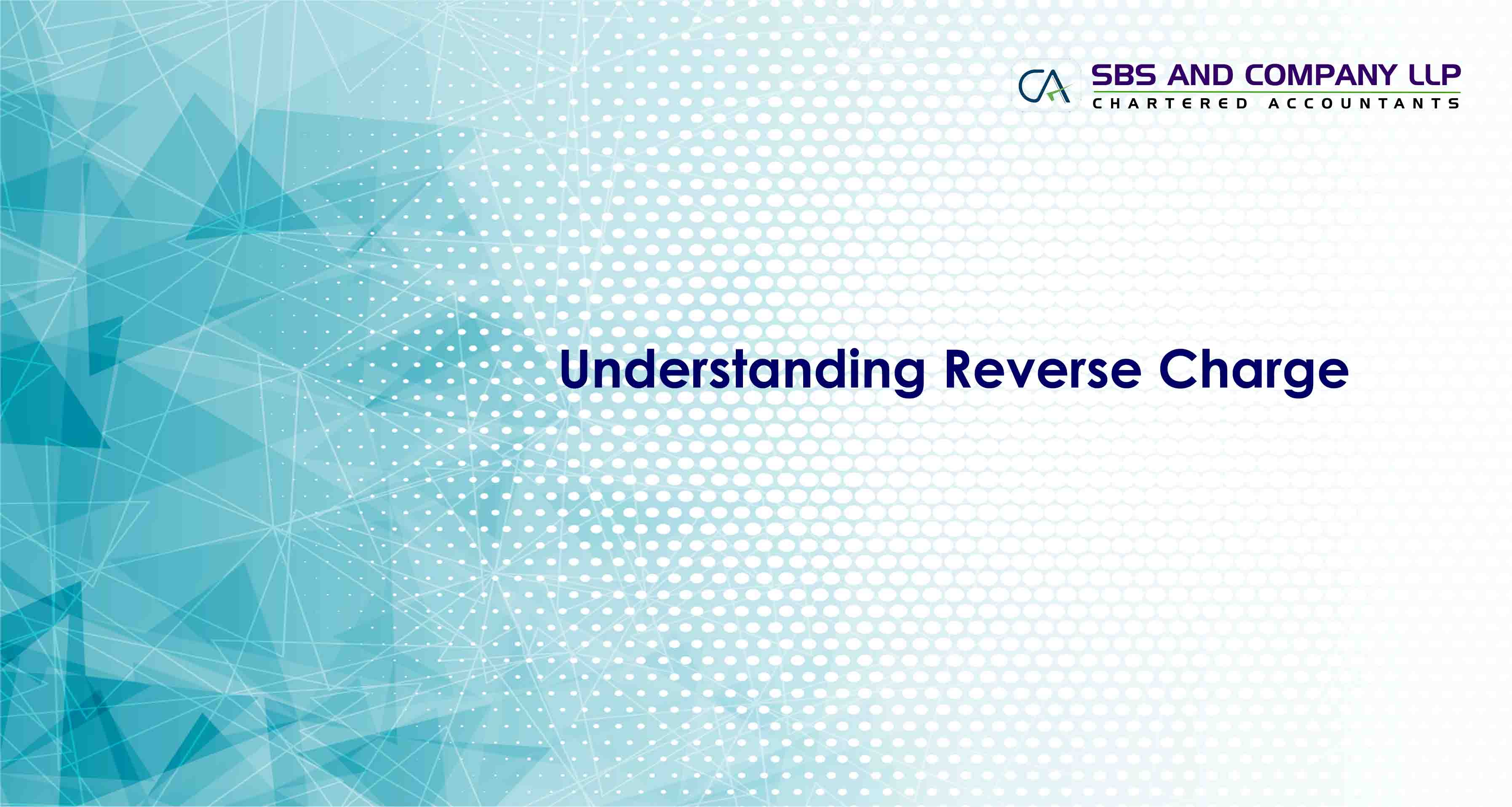One of the painful concepts under the Goods & Services Tax (GST) laws is the concept of reverse charge. The concept of reverse charge was known to the trade dealing with both goods or services. However, under GST laws, the said concept has taken a new shape and has become a night mare for majority of the trade. We shall try to dwell on such issues in this article after a brief understanding of the law.
Principally, under the indirect taxation laws, the tax has to be collected and paid by the supplier, who is engaged in supply of goods or services. However, under certain notified circumstances, the burden of payment of tax is shifted on the recipient of the supply of goods or services. Hence, colloquially, the said tax shift is referred as reverse charge.
Under GST laws, the recipient is obliged to pay tax on receipt of supply of goods or services or both vide two sections, namely Section 9(3) and 9(4) of Central Goods & Services Tax Act, 2017 (CGST Act). Similar sections with same verbatim, are there under the State Goods & Services Tax Act (SGST Act), Integrated Goods & Services Tax Act (IGST Act)and Union Territory Goods & Services Tax Act (UT GST Act).
Section 9(3) of CGST Act talks about instances, where the tax has to be paid by recipient of supply of specific goods or services or both, as notified by the government. Vide Notification No 04/2017 – CT (Rate) dated 28th June, 17 and Notification No 13/2017- CT (Rate) dated 28th June, 17, the government has notified the specific category of goods and services respectively on which reverse charge is applicable.
Section 9(4) of CGST Act talks about instances, where tax has to be paid by recipient of supply of goods or services or both, when purchased from an unregistered supplier. Hence, all taxable purchases made from unregistered supplier would attract tax under reverse charge. However, the central government on recommendations of the council has exempted supplies aggregating to the value of Rs 5,000/- per day when purchased from unregistered supplier vide Notification No 8/2017-CT (Rate) dated 28th June, 17.
With the above understanding, let us now address certain frequently asked question under reverse charge.
Section 9(3):
- We are engaged in trading of goods. We were given to understand that there will be a reverse charge liability only if we purchase certain notified goods like cashews or services like services from advocates. Is this in accordance with the law?
The reverse charge under GST laws is under two sections as detailed above namely Section 9(3) and Section 9(4) of CGST Act. Section 9(3) deals with the reverse charge liability if certain notified services or goods are procured(for example cashew or advocate services.
7 | P a g e
SBS Wiki www.sbsandco.com/wiki
Section 9(4) deals with the reverse charge liability when goods or services are procured from unregistered supplier. Hence, there would be liability under reverse charge even you are purchasing goods or services other than those notified vide Notification No 04/17 & 13/17 – CT (Rate) dated 28th June, 17.
- What are the goods that are notified for liability under reverse charge under Section 9(3) of CGST Act?
The following are the goods that are notified for liability under reverse charge under Section 9(3) of CGST Act by virtue of Notification No 04/17-CT (Rate) dated 28th June, 17:
- Cashew Nuts, not shelled or peeled falling under Chapter 0801
- Bidi Wrapper Leaves (tendu) falling under Chapter 1404 90 10
- Tobacco Leaves falling under Chapter 2401
- Silk Yarn falling under Chapters 5004 to 5006
- Supply of Lottery
The above goods when supplied and received by certain notified persons, the tax has to be paid by notified recipient of such supplies.
- What are the services that are notified for liability under reverse charge under Section 9(3) of CGST Act?
The following are the services that are notified for liability under reverse charge under Section 9(3) of CGST Act by virtue of Notification No 13/17-CT (Rate) dated 28th June, 17:
- Goods Transportation Agency Services
- Advocate Services
- Arbitral Tribunal Services
- Sponsorship Services
- Services provided by Central/State Government or Local Authority except certain notified
- Director of Company/Body Corporate
- Insurance Agent Services
- Recovery Agent Services
- Supplies of Services of Author/Music Composer/Photographer/Artist/Like
The above services when supplied and received by certain notified persons, the tax has to be paid by notified recipient of such supplies.
8 | P a g e
|
Understanding Reverse Charge
|
SBS Wiki www.sbsandco.com/wiki
- Under the service tax laws, the services of works contract, rent-a-cab, manpower and security services were notified under partial reverse charge mechanism? Does such mechanism continue even under GST laws?
Under GST laws, the concept of partial reverse charge does not exist. Further, the services of works contract, rent-a-cab, manpower and security services are not notified under Section 9(3) of CGST Act read with Notification No 13/2017-CT (Rate) dated 28th June, 17. Therefore the said services are not directly covered under reverse charge. These services will be under reverse charge only when they are procured from unregistered suppliers in terms of Section 9(4) of CGST Act. The FAQs relating to Section 9(4) are detailed hereunder.
- We are a company engaged in construction services. During the year, we have placed order for certain materials from our vendor. As per the agreement, we have to incur the freight for obtaining the goods to our construction site. The vendor has arranged for a Goods Transport Agency Services (GTA) and accordingly the GTA has delivered goods at our site. Now, the GTA has raised invoice for the supplies with a tax of 5% . Can we make the payment of tax to the GTA?
Since the services provided by GTA are notified services under Notification No 13/2017- CT (Rate) and the recipient is also a notified person, the obligation to pay tax shall be on the company and not the GTA supplier.
Hence, the GTA has to raise invoice without tax component and the tax has to be paid by the company to the credit of central government. Further, it is important to note that tax being paid to GTA is not a proper compliance and the authorities can insist tax payment again from the company since the obligation is on the company.
- In the above question, whether there would be any change if the GTA charges 12% of tax instead of 5%?
Vide Notification No 22/2017-CT (Rate) dated 22nd August, 17, the government has made an amendment to Notification No 13/2017 – CT (Rate). As per the changes done, if the GTA charges 12% of tax, the recipient is not obliged to pay tax under reverse charge.
Hence, in the given case, since the GTA supplier has charged tax @ 12% instead of 5%, the obligation of payment of GST is on the GTA supplier and not on the person who has received the services.
- Under the service tax laws, if the services are procured by a person located in taxable territory from a person located in non-taxable territory, the obligation to pay service tax on such services was on the recipient of services that is the person located in taxable territory. This was evident from the erstwhile Notification No 30/2012-ST dated 20.06.2012. However, under GST laws, when we see the Notification No 13/2017-CT (Rate), such services were not specified. Does that mean there is no concept of import of services under GST laws?
Under GST laws, the concept of import of services is taken care by the IGST Act. Vide Section 7(4) of IGST Act, import of services into territory of India are specified as inter-state supplies.
9 | P a g e
|
Understanding Reverse Charge
|
SBS Wiki www.sbsandco.com/wiki
Hence, the notification for reverse charge has to be seen under IGST laws and not under CGST laws. Accordingly, Entry 1 of Notification No 10/2017- CT (Rate) dated 28th June, 17 specifies that the person liable to pay tax in case of services supplied by any person who is located in non-taxable territory to any person located in taxable territory, as the person located in taxable territory.
- We have procured services from a goods transport agency (GTA) who is registered under GST laws. On a plain reading of reverse charge concepts, it is understood there will not be any liability under reverse charge for the services procured from GTA, since he is registered. The reverse charge liability will arise only when purchases were made from unregistered suppliers. Is this accordance with the law?
No. GTA is one of the notified services under Section 9(3) of CGST Act and accordingly services procured from GTA shall be subjected to reverse charge in the hands of the recipient of supply. This holds good even the GTA is registered.
The liability under Section 9(3) of CGST Act does not depend upon the registration status of the supplier. It depends upon whether a particular service or good is notified to be under reverse charge as per Section 9(3).
Section 9(4):
- What is the scope of Section 9(4) of CGST Act? Are there any goods or services which are notified under Section 9(4) of CGST Act to qualify for liability under reverse charge?
- s stated earlier, Section 9(4) of CGST Act casts an obligation to pay tax under reverse charge on supply of taxable goods or services or both when received from an unregistered supplier. Hence, if the supplier is unregistered, then there would be a liability under reverse charge vide Section 9(4) of CGST Act, irrespective of the fact that those goods or services are not notified.
- We are a company purchasing goods or services from unregistered suppliers. As per Section 9(4), the liability under reverse charge exists. Is there any exemption from such liability or all purchases are taxable?
Vide Notification No 8/2017-CT (Rate) dated 28th June, 17, the government has exempted all intra-state supplies of goods or services or both received by a registered person from unregistered suppliers. However, such exemption shall not be available if the aggregate value of supplies of goods or services or both received by a registered person from any or all the unregistered suppliers when exceeds Rs 5,000/- rupees in a day.
- We are a company engaged in providing software services. We procure daily certain items from 6 unregistered suppliers which would amount to Rs 3,000/- per vendor. In such a case, whether the exemption specified in Notification No 8/2017- CT (Rate) shall be applicable, since per vendor, the limit of Rs 5,000/- has not exceeded?
10 | P a g e
|
Understanding Reverse Charge
|
SBS Wiki www.sbsandco.com/wiki
The exemption of Rs 5,000/- per day is not per vendor or supplier. The limit is for the purchases made from all the unregistered suppliers in a day. In the case of your company, since you are purchasing from 6 vendors, the total purchases will amount to Rs 18,000/- per day, which exceeds Rs 5,000/-limit and becomes taxable.
- In the above case, whether the tax under reverse charge has to be paid on Rs 18,000/- or Rs 13,000/- (Rs 18,000 – 5,0000)? That is to say, whether Rs 5,000/- per day is a standard exemption?
The exemption of Rs 5,000/- per day is not a standard exemption. If the purchases from all unregistered suppliers exceed Rs 5,000/- per day, then the total amount paid for such purchases shall be taxable. Rs 5,000/- is only for qualifying amount for such exemption. Hence, in the instant case, Rs 18,000/- becomes taxable and not Rs 13,000/-.
- We are a firm of chartered accountants. We do not have regular purchases from unregistered suppliers. That is to say, the Rs 5,000/- per day limit is not exhausted many a times. In such case, whether such amount of Rs 5,000/- can be carried forward? That is to say, on 29th August, 17, we do not have any purchases from unregistered supplier. On 30th August, 17, we have purchased services from an unregistered supplier amount to Rs 10,000/-. Are we not required to pay tax on Rs 10,000/- since the limit available on 29th August can be used on 30th August?
The limit of Rs 5,000/- exhausts every day. The amount cannot be carried forward and be utilised next day or subsequent period. Hence, the tax is required to be paid on Rs 10,000/- on 30th August, 17.
- We are a company engaged in manufacture of pharma products. We make purchases from unregistered suppliers on a day to day basis like procurement of tea, coffee and snacks. However, the bill for such vendors is settled once in a month. Let us say, the monthly bill from such vendor is Rs 1,50,000/-. In such a case, whether we can take the exemption of Rs 5,000/- per day and not pay tax on such supplies?
As stated above, the limit of Rs 5,000/- is per day and cannot be carried forward and utilised for entire month. Hence, the purchases from such vendor attracts tax under reverse charge on Rs 1,50,000/-.
- We are a company engaged in provision of construction services. During the month, we have procured certain goods which has rate of tax as NIL from unregistered suppliers amounting to Rs 15,00,000/-. In such case, whether reverse charge is applicable on such purchases?
The liability under reverse charge exists only when there is a supply of taxable goods or services from unregistered suppliers. Since, in the instant case, the purchases are of NIL rated, there cannot be any tax liability under reverse charge under Section 9(4) of CGST Act. Similar, is the case for exempted purchases also.
- While calculating the daily limit of Rs 5,000/- per day, whether all purchases or only taxable purchases from unregistered suppliers shall be calculated? That is to say, a company has purchased goods which attracts NIL rate of tax Rs 3,000/- and goods of Rs 4,000/- which attracts rate of tax at 18%. Whether while calculatingRs 5,000/- limit, should we consider Rs 3,000/- value of goods, which attracts NIL rate of tax?
11 | P a g e
|
Understanding Reverse Charge
|
SBS Wiki www.sbsandco.com/wiki
While calculating the daily limit of Rs 5,000/-, only taxable supplies has to be considered. This is evident from the language used in the Notification No 08/2017 – CT (Rate) dated 28th June, 17. The language used is as under ‘Provided that the said exemption shall not be applicable where the aggregate value of such supplies of goods or services or both received by a registered person from any or all of the suppliers, who is or are not registered, exceeds five thousand rupees in a day’.
The phrase ’such supplies’ used in notification refers to the supplies referred in Section 9(4) of CGST Act. The said section uses the phrase ‘supply of taxable goods or services or both…….”.Hence, it can
be inferred that while calculating the daily limit of Rs 5,000/- only taxable goods or services has to be considered.
Further, the exemption under this Notification is a general exemption. It is well-established legal principle that what are exempt specifically cannot be exempt again by way of general exemption. Therefore, the phrase ‘such supplies’ used in this notification would mean the supply of those goods or services or both which are not exempt under any other notification.
Accordingly, in the question posed, the value of Rs 3,000/- which attracts NIL rate of tax is not to be considered and hence the purchase of Rs 4,000/- would qualify for exemption under Notification No 08/2017- CT (Rate) dated 28th June, 17.
Reverse Charge vis-à-vis Registration:
- We are a company engaged in provision of services. Our turnover in the current financial year has not exceeded Rs 20 lakhs. We have purchases from unregistered suppliers for which tax has to be paid under reverse charge vide Section 9(4) of CGST Act. In such case, do we need to register under GST laws?
The exemption from registration based on the aggregate turnover as specified in Section 22 is subject to the persons who require registration under Section 24 of CGST Act. That is to say, Section 24 of CGST Act has an overriding effect on Section 22.
One of the persons that requires mandatory registration under Section 24 is ‘persons who are required to pay tax under reverse charge’. The phrase ‘reverse charge’ has been defined vide Section 2(98) of CGST Act as ‘means the liability to pay tax by the recipient of supply of goods or services or both instead of supplier of such goods or services or both under sub-section (3) or sub-section (4) of Section 9, or under sub-section (3) or sub-section (4) of Section 5 of Integrated Goods and Services Tax Act’.
Since, there is a liability for the company under Section 9(4) of CGST Act, the company has to register mandatorily as per Section 24 despite of the fact there is eligibility for exemption under Section 22.
12 | P a g e
|
Understanding Reverse Charge
|
SBS Wiki www.sbsandco.com/wiki
- 1 We are a company engaged in provision of health care services. Our services are exempted under
Notification No 12/2017 – CT (Rate) dated 28th June, 17. We have made purchases from unregistered suppliers and hence there is a liability under Section 9(4) on us. However, we are of the opinion that since our supplies are completely exempted, we are eligible from exemption from registration under Section 23 of CGST Act and accordingly we are not supposed to pay GST under reverse charge. Are we right?
Section 23 of CGST Act provides exemption from registration for any person who is engaged exclusively in the business of supplying goods or services or both that are not liable to tax or wholly exempt from tax.
Since in the instant case, the company is engaged exclusively in the business of supplying services which are exempt from tax, they are eligible for exemption from registration under Section 23 of CGST Act.
However, in light of Section 24 of CGST Act, they have to obtain registration, since there is a liability to pay tax under reverse charge. The word ‘exclusively’ used in Section 23 ibid assumes importance, since supplies liable to pay tax under reverse charge are deemed to be provided by the person who receives such supply by virtue of language used in Section 9(3) or 9(4) of CGST Act.
- I am engaged in trading of goods and my turnover in the previous financial year has not exceeded Rs 75 lakhs and hence I have opted for composition under GST laws. I have made certain purchases from unregistered suppliers. Am I required to pay tax under reverse charge?
Yes, the provisions of Section 9(4) of CGST Act, shall be applicable to a registered person. Since the pre-requisite for opting for composition scheme is to obtain registration, there shall be a liability under reverse charge on you.
- We are a partnership firm engaged in manufacture of goods. We have obtained registration under GST laws for making supplies. During the course of the year, we have procured certain materials from a composition dealer. Are we required to pay tax under Section 9(4) of CGST Act?
Section 9(4) of CGST Act applies only when purchases are made from unregistered suppliers. Since the pre-requisite for opting for composition is to obtain registration, the purchases made from composition dealer shall be treated as purchases from registered person and accordingly there will be no liability under Section 9(4) ibid.
- We are a company engaged in development of software and located in SEZ. We have made certain purchases from unregistered dealers. Are we liable to pay tax under Section 9(4) of CGST Act?
Yes. There shall be a liability to pay tax under reverse charge since purchases were made from unregistered suppliers. The same can be claimed as credit and applied for refund under Section 54 of CGST Act.
13 | P a g e
|
Understanding Reverse Charge
|
SBS Wiki www.sbsandco.com/wiki
Notification No 18/2017- IT (Rate) dated 05th July, 2017 exempts services imported by a unit or a developer in the SEZ from the whole of the integrated tax leviable under Section 5 of IGST Act. Hence, accordingly, it can be concluded that there cannot be any liability under reverse charge even if SEZ developer or unit purchases from unregistered supplier. However, such a view can be aggressive since the word ‘import’ cannot be applied to services procured from domestic tariff area.
- We are a company engaged in restaurant services. We procure goods or services from various unregistered suppliers. Recently, we have come to know that purchases from unregistered suppliers would attract compliance under reverse charge vide Section 9(4) of CGST Act. In this regard, we have asked our vendors to register under GST laws and charge us GST. However, they have stated that they are eligible to claim the exemption from registration if the turnover is less than Rs 20 lakhs as specified in Section 22 of CGST Act and accordingly they are not required to register. In such case, whether we are required to pay under reverse charge even the vendor qualifies exemption from registration under Section 22?
The reverse charge under Section 9(4) exists even when the vendor is not required to register because of the exemption mentioned in Section 22 of CGST Act. The liability under Section 9(4) is not dependent on whether the vendor is required to register or not.
General:
- Whether the liability under reverse charge can be paid using the input tax credit?
As per Section 49(4) of CGST Act, ‘the amount available in electronic credit ledger may be used for making any payment towards output tax……’.
The phrase ‘output tax’ has been defined vide Section 2(82) of CGST Act ‘in relation to a taxable person, means the tax chargeable under this Act on taxable supply of goods or services or both made by him or by his agent but excludes tax payable by him under reverse charge’.
Hence, the liability under reverse charge either under Section 9(3) or Section 9(4) of CGST Act cannot be paid using input tax credit.
- Whether the tax paid under reverse charge can be taken as credit?
The phrase ‘input tax’ has been defined vide Section 2(62) of CGST Act to include ‘tax payable under the provisions of sub-sections (3) and (4) of Section 9.Hence, the tax paid under reverse charge can be availed as input tax credit.
- We procure services of rent-a-cab from unregistered vendors and we pay tax under Section 9(4). We heard that all the taxes paid under reverse charge can be availed as input tax credit. Is our understanding in accordance with the law?
14 | P a g e
|
Understanding Reverse Charge
|
SBS Wiki www.sbsandco.com/wiki
The tax paid under reverse charge can be availed as credit subject to the provisions of Section 16 and Section 17 of CGST Act. The credit entitlement under GST laws is dealt by Section 16 of CGST Act. Section 17(5) ibid specifies the credits which are not available for the registered person, where tax paid on renting of motor vehicles is one of the item.
It is to be noted that Section 17(5) overrides Section 16 because of the language used in the former provision. Section 17(5) of CGST Act starts with the phrase ‘Notwithstanding anything contained in
sub-section (1) of Section 16…..”.
Hence, the credits which are not available because of Section 17(5) of CGST Act cannot be availed even they are paid under reverse charge. Hence, tax paid on reverse charge for rent-a-cab service shall not be eligible for credit.
- We have procured certain services from registered vendors, where they have charged GST and compensation cess. Similar items are purchased from unregistered vendors. When we are paying under reverse charge, are we required to pay the compensation cess or only the GST?
The concept of reverse charge is shifting the tax liability from the supplier to the recipient. Except that there are no changes in tax payments. Hence, if a supply attracts GST and compensation cess, the recipient has to pay both GST and compensation cess even under reverse charge. The compensation cess paid can be taken as credit (if it is not falling under the ambit of Section 17(5) of CGST Act) and can be used against payment of compensation cess on output liability of the recipient, if any.








